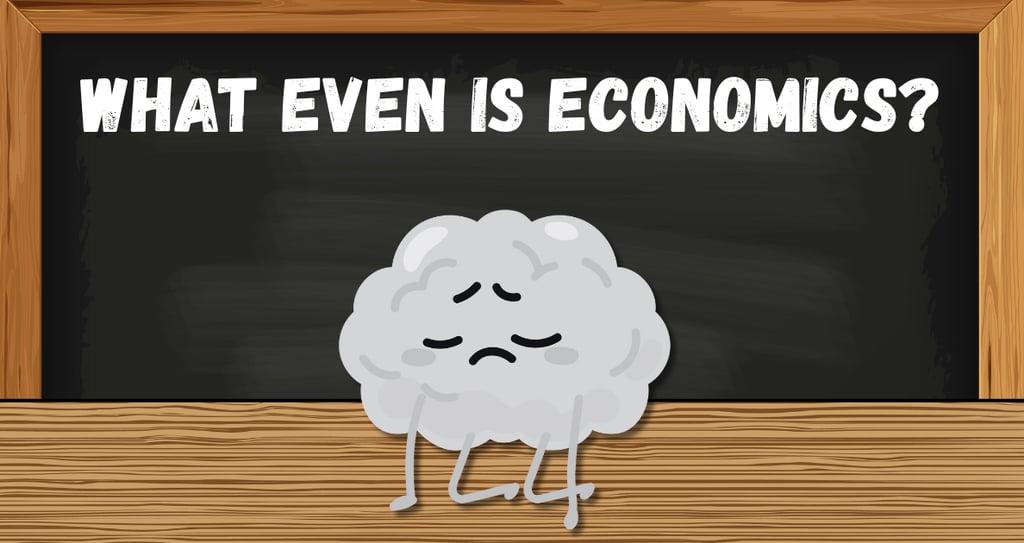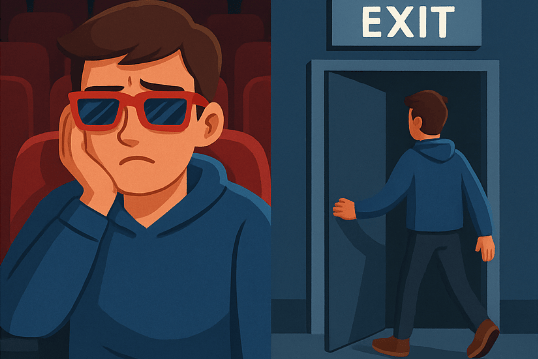Brain Rot Econ #2: Why Saying Yes Means Saying No (Opportunity Cost)
I walked out of The Flash and accidentally learned opportunity cost. Here’s why every “yes” costs you something—and how to make smarter choices because of it.
5/17/20248 min read


20 minutes into watching The Flash, I was, for the first time ever, actually considering walking out of the theater—realizing much later that what I was really calculating was something called opportunity cost.
Getting a kick out of connecting school concepts to real life might be the nerdiest thing I’ve done—but hey, it’s weirdly fulfilling. Unlike the Pythagorean theorem (which I’m still waiting to use), opportunity cost actually makes sense. It explains why every “yes” in life is also a “no” to something else—basically, you’re always giving something up. Let’s dive into why that simple idea is way more important than it sounds.
What is Opportunity Cost?
Put simply, opportunity cost is what you give up when you choose something else. It’s not just about money—it’s about the next best thing you could’ve done but didn’t.
Let’s say you wake up too tired to go to school and decide to “call in sick.” Instead of dragging your lazy butt out of bed, you choose comfort. But that decision comes with a cost: the knowledge you could’ve gained, the grades you might’ve improved, the school fight that was bound to break out, and maybe even the president showing up for a surprise visit.
That’s opportunity cost—all the things you missed out on because you stayed up too late the night before doing who knows what.
And the worst part? You don’t always realize what you gave up until it’s already gone.
Opportunity Cost In Real Life
You vs. the World: Everyday Trade-Offs
We make trade-offs constantly—and most of the time, we don’t even realize it. Every decision, no matter how small, comes with a hidden “receipt” for what you didn’t choose.
Ever been playing a game and someone says, “We can’t end on a loss,” and suddenly it’s 4 AM? Those hours didn’t just lead to more L’s—they cost you sleep, burned-out eyes, and probably the motivation to do anything productive the next day.
Opportunity cost sneaks in everywhere:
Choosing sleep over studying = less stress now, maybe a worse grade later
Scrolling TikTok for 2 hours = brain rot now, instead of doing literally anything else
Ordering DoorDash again = convenience now, and somehow your bank account is empty in two weeks
You didn’t think of it as economics—but that’s exactly what it was.
The Flash Movie Example
20 minutes into The Flash, I was going through it. It was the first time in my life I actually considered walking out of a theater—not because I had somewhere to be, but because the movie was that bad.
So I weighed the pros and cons—a.k.a. the opportunity costs.
If I stayed, I’d lose two hours of my life, my attention span, and the chance to grab ice cream to ease the pain.
If I left, I’d miss the (very slim) chance the movie got better, wouldn’t get my money’s worth, and couldn’t fully trash it with a complete opinion.
In the end, I left—because to me, the cost of staying was worse. No regrets.
That’s the part no one talks about: staying isn’t free. The real cost was everything else I could’ve done instead. Once I stopped worrying about the money I’d already spent, I started valuing my time as its own currency—and started noticing trade-offs like this everywhere.
It’s not always about making the “right” choice. It’s about knowing that every yes means saying no to something else—even if that something else is peace of mind… or saving myself from a slow motion scene every other minute.
The Economics Behind It (But Not Too Much)
Everyday decisions that actually add up
In real life, you’re not writing out the pros and cons of going to class—it’s more like that gut-drop moment when you realize you skipped a test. But in econ, we do write things down to figure out exactly what we’re giving up.
Let’s say your job pays $20 an hour. Your favorite artist is in town, and a concert ticket costs $50. If you skip work to go, you’re not just spending the $50—you also miss out on the $20 you could’ve earned.
So the real cost?
$70. That’s your opportunity cost: the concert ticket + lost wages.
You didn’t just buy a ticket—you gave up money and time. You wouldn’t write this down in everyday life, but in econ class (if you're trying to pass), yeah... they want the math.
Zooming Out: What If Countries Made These Decisions?
And this idea gets even deeper when countries start making decisions.
Now imagine two countries that each have a full day to make stuff—but they can only make one thing at a time: either shoes or phones.
Country A can make 10 shoes or 5 phones
Country B can make 6 shoes or 6 phones
Country A:
If they choose to make 1 phone, they’re giving up 2 shoes
(because 10 shoes ÷ 5 phones = 2)
So the opportunity cost of making 1 phone = 2 shoes
Country B:
If they choose to make 1 phone, they’re giving up 1 shoe
(because 6 shoes ÷ 6 phones = 1)
So the opportunity cost of making 1 phone = 1 shoe
That matters because the country that gives up less to make something is better off focusing on it. In this case, Country B should make phones, because they give up fewer shoes to do it.
This is how economists figure out who should make what—and why it’s smarter to specialize instead of trying to do everything.
We’ll dig into that more in a future post on comparative advantage. For now, just remember:
Every time you choose one thing, you're giving something else up—and sometimes the numbers help you see which choice is actually worth it.
How to Use Opportunity Cost Like a Brain Upgrade
The “Is It Worth It?” Filter
You don’t need to treat every decision like it’s chess, but before saying yes to something, try asking:
“What am I giving up to do this?”
That one question turns you into a mini version of Adam Smith, the so-called father of economics, and gives you actual self-awareness when making choices.
Saying yes to hanging out might feel fun now, but what if it means giving up time to finally finish that assignment you’ve been dodging?
Saying yes to one more game might seem harmless—but suddenly you’ve given up sleep and the ability to function tomorrow.
You can still say yes—just know what it’s costing you.
Opportunity Cost as Your Life Hack
This isn’t about becoming the next Adam Smith. It’s about avoiding those moments where you're shocked your grades tanked—even though deep down, you know exactly why.
Opportunity cost is your mental cheat code. It helps you make better choices, even with dumb stuff like:
Choosing protein bagels over donuts = giving up flavor for gains
Skipping leg day = choosing comfort over quads
Re-watching the same reels on Instagram = giving up time you swore you'd use to study
When you start seeing your time, energy, and attention as limited resources, everything changes.
You stop drifting through your day—and start actually choosing how you spend it.
Brain Rot Recap: What You Should Remember
Quick Recap (Because I Know You Forgot Already)
Opportunity cost = what you give up when you choose something else.
It’s not just about money—it’s time, energy, sleep, sanity, everything.
You already use this logic—now you just know what to call it.
Once you see it, you can’t unsee it—and suddenly your decisions have purpose.
Make It Stick
You’re more likely to remember this if it sounds dumb—so here we go:
Saying yes to Chipotle = saying no to that $15 you could’ve saved
Skipping a workout = giving up future abs (don’t do this)
Saying yes to a 2-hour scroll session = saying no to your to-do list, again
Saying yes to one more game = saying no to sleep, sanity, and possibly your GPA
Every decision is a trade-off. The trick is just realizing it before your day disappears and you’re left wondering where your time (or your abs) went.
A few years later, and I’ve never made the same mistake. That 20 minutes of The Flash was one of my first real economics lessons—even if I didn’t know it at the time. If I had stayed, the opportunity cost would've been way worse: my time, my sanity, and probably my faith in cinema. But by walking out, I saved myself from yet another slow-motion scene—and reminded myself how much I actually value my time.
Looking back, opportunity cost isn’t just some concept for explaining why countries specialize in trade—it’s about you, and becoming more self-aware of how you spend your time, energy, and attention. It’s about making intentional choices instead of sleepwalking through your day.
And here’s the cool part: opportunity cost is exactly what we use to figure out who has a comparative advantage—which is what’s coming up next.
In Brain Rot Econ #3, we’re taking it a step further with comparative advantage—the reason why trying to do everything yourself might be the worst economic move you can make.
If your brain isn’t fully fried yet, we’re just getting started.





















































